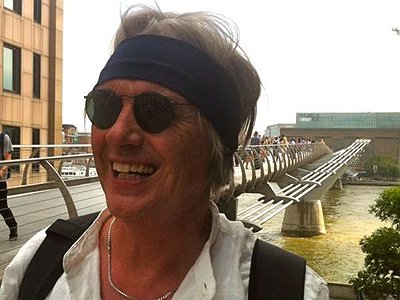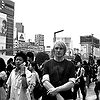As more and more people are producing and releasing music, there has been an exponential growth in promotion agencies. What's your perspective on the promo system? In how far is it influencing your choice of artists and topics, in how far is it useful for pre-selection, in how far do you feel it is possibly undermining journalistic freedom?
It doesn’t influence my own choice in any way. Each week I look for new music. I don't try to make my show popular by playing popular music. I don't have a problem with Top 40 or chart programmes, but I have a problem when it becomes 24 hours a day and nothing else. There are other things, and other ways of playing music on the radio.
Promo systems do undermine journalistic freedom. I remember when I was working for WDR they had a big programme reform. The freelance presenters were on the PR mailing lists of course, but the radio show said they were going to make sure the freelancers were taken off everyone's mailing list because they, the programme heads - not the presenters - wanted to decide what music will be played. They had a wheel that would determine the playlists to make sure music from each genre or group would get airtime and the computer would spit it out. The presenters were simply left to create a 'good time' mood and nothing more. To a point that's ok, but individuality gets lost and talent gets overlooked and undervalued.
The influence of the record companies has reduced an incredible amount. They've almost become superfluous. Now you've got Kickstarter and other software that's undermining the old systems.
How do you see the role of music journalism in the creative process? Should it amplify public taste, distinguish the good from the bad, inform, promote artists, or, as Howard Mandel put it, “illuminate, educate and entertain” listeners? Do you feel that, as part of your work, music needs to be explained or should it retain its “inexplicable nature”?
That still applies for sure. What is so important when you read something is that you establish a relationship with this person and that you trust them. You don't have to like everything that they like, but with trust comes an open mindedness to try new things.
I've always enjoyed the work of John Mulvey from Uncut, Nick Kent from NME or Lester Bangs. They're passionate about their work and to me that's what's important. They're not trying to sell me something. Music journalism is still incredibly important, but I think the emphasis is shifting away from print and onto the Internet.
The new technologies and apps for recommending music are really interesting. You can very quickly get taken to bands that you've never even heard of and that could be interesting because for a long time that was almost impossible. Today the variety of music available is incredible. In the past to get music out you needed all this infrastructure. Doesn’t mean it's all great but the variety is far greater than at any other time.
I'm not interested in having a strong opinion about music or trying to convince anybody about what they should be listening to. I think that there's less room or necessity for this now. Some people will always want to be told what to buy but that's not what I want to do. There's technology now that means you can listen and decide for yourself before you buy anything.
Format radio has frequently been attacked for stripping presenters of the right to select music themselves, relying instead on automated playlists. What's your position on the relevance of quantitative rating systems, statistics and algorithms? How would you describe the importance of subjectivity for your work?
Subjectivity is important. I think at certain times of the day automated programmes are acceptable but what I object to is the way it's done across the board. For example, why can't my show be aired at 4am? Don't tell me there are rating issues at 4 in the morning. Why is there not room for everything? I'm not against any one thing as long as there's room for other things.
There should be more people on the radio doing something different. There are so many stations, why can't there be more variety? The audience is not stupid. I don't like this arrogant approach towards the audience that we know what they want. I have no idea what anybody wants to listen to.
Whom do you feel your obligation to – the artists, the readers, the broadcaster you're working for? In how much do you feel is music journalism restricted by external factors?
In the end it's to yourself. You have some obligation obviously to the people that you work for, they're the ones that pay you, so you are obliged to some extent. But I don't think I'm obliged to do what they want me to do because I don't think they know themselves. I present them with what I can do, and my obligation is to do the best work I can and hope that somebody will sponsor it, and somebody will listen to it and like it. The chain of obligation is to be true to what you do and if nobody wants it then tough. The problems start when people start changing it, it becomes a hodge-podge of bits and pieces that don't really fit together and the person doing it no longer feels comfortable. It's not an egotistical thing to do the best that you can.
Social media are allowing for a closer relationship between listeners and presenters than ever before. Do you see this as a potential for improvement or rather as a problem?
I've always felt that what makes you strong is equally what makes you weak. The strength of social media is also it's weakness. A lot of people want to impress their friends with what they're listening to and then you get back to the kind of situation like when Eno said he was listening to Michael Jackson and suddenly it became OK for everyone to do the same. It becomes a question of peer groups approving of what you can and can't listen to.
Eventually you start to look up to certain people and that's the guy who's going to tell you what you should listen to. The danger of the social media is that you pick out the people that are going to tell you what to listen to, whether it's Brian Eno or Justin Timberlake, and it's these people that will push you in a certain direction and it's fine as long as you stay open minded. But the stigma of listening to things that you're not supposed to is not good.
What, to you, are key factors for the future of radio? What, do you feel, could – or should - be new forms and formats for music journalism in general?
There's no need to change things around drastically. There are people who know what they're talking about and are enthusiastic and committed to their work and that won't ever change. There should always be room for those people, but whether there will be room is another thing because commercialisation always limits the possibilities. But thankfully we've always got the internet which is a threat to big business. It gives people the opportunity to find out things for themselves, whereas previously the system would tell you what to buy, by releasing it and the radio will tell you what to buy by playing it. Now we're in a position where people can make up their own minds.
Music-sharing sites and -blogs as well as a flood of releases in general are presenting both listeners and artists with challenging questions. What's your view on the value of music today?
It's very hard to talk about the value of music anyway. For me, what's changed is that because I'm always looking for new music, I don't listen to things many times. Whereas I used to, I would have favourite records that I knew inside out. For me that's gone. I don't know whether it's because I'm looking for new music for the show or the fact there's so much available and I'd rather keep discovering something new than keep listening to something that I already know. It's good to find new things all the time but it means your listening is far more superficial and you skip over things, you miss the depth that can be got out of something.
Please recommend two radio programs or journalists to our readers which you feel deserve their attention.
KCRW, public broadcaster in Los Angeles. Their morning show, Morning Becomes Eclectic and then an evening show called Metropolis that I think is on around 7pm.




